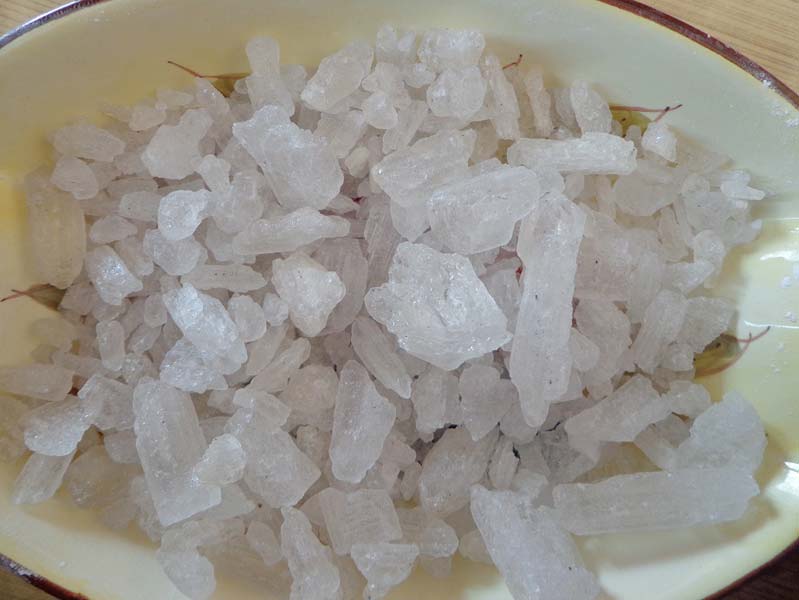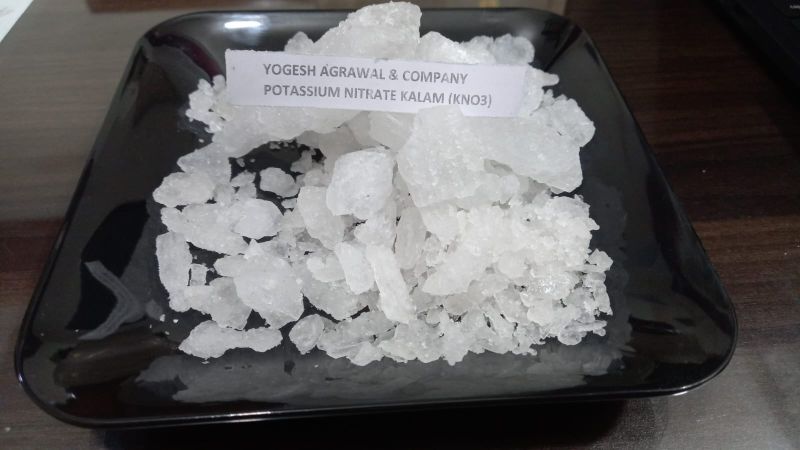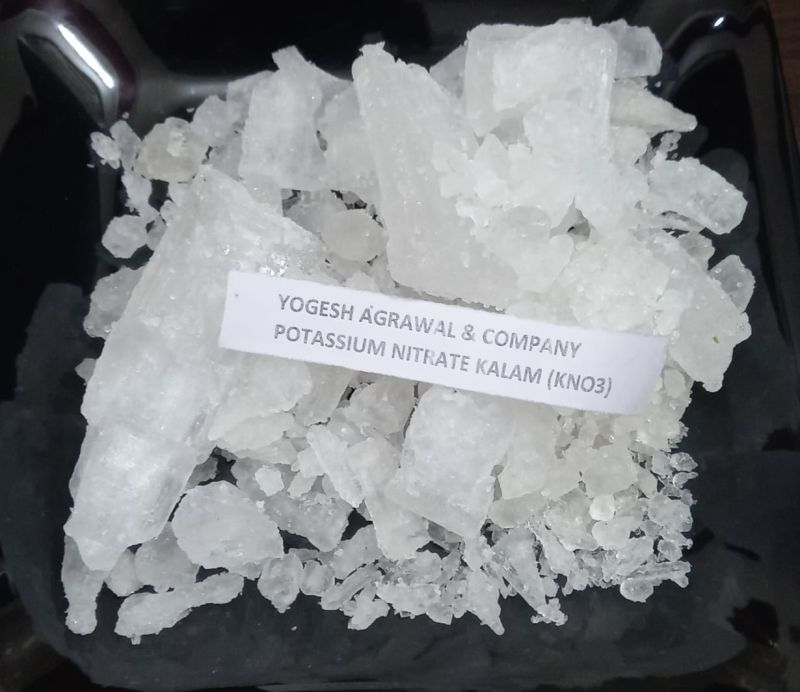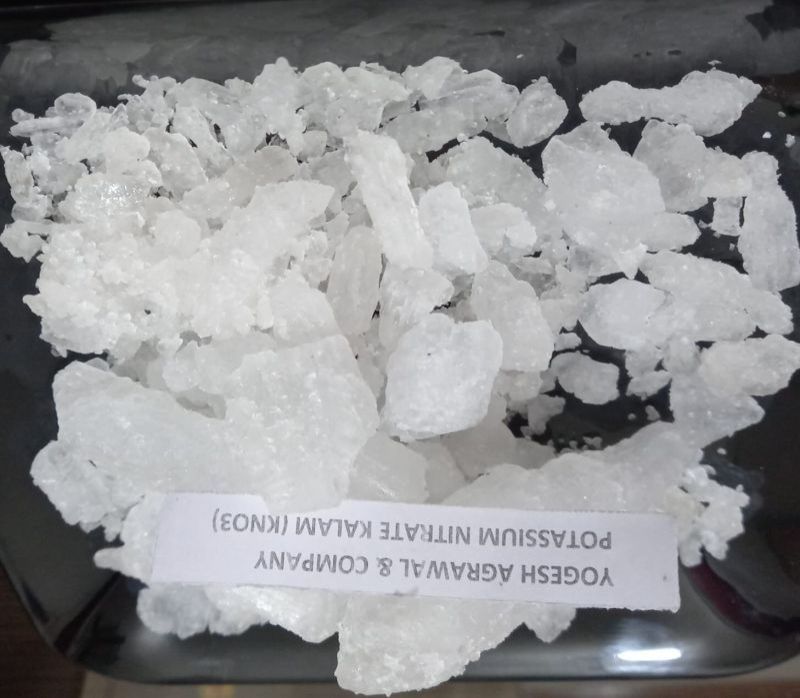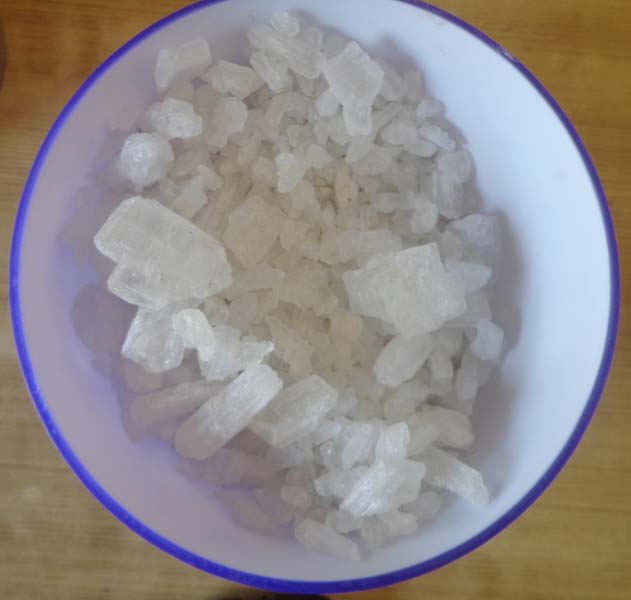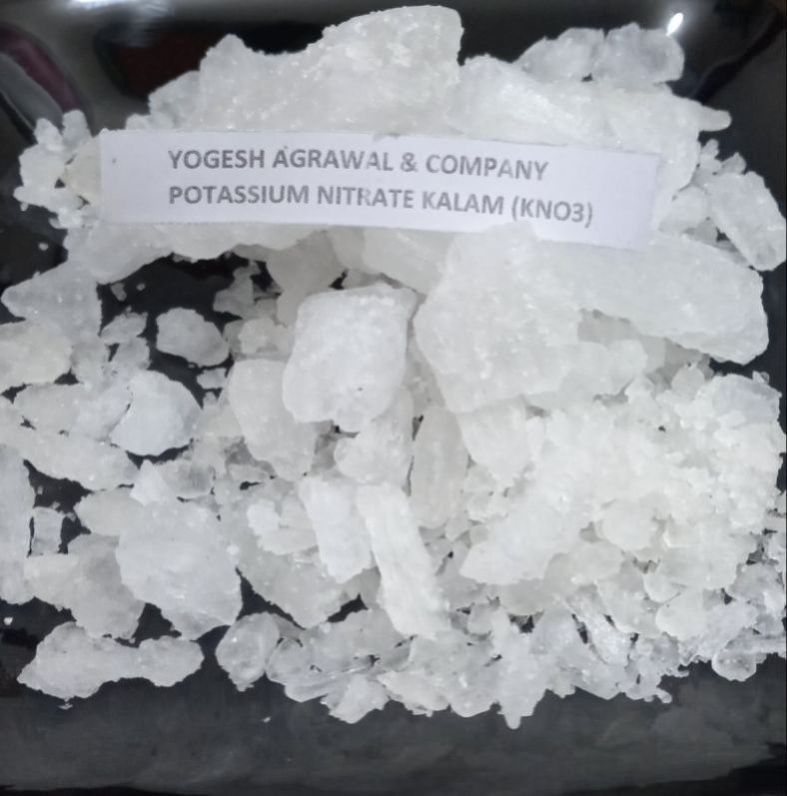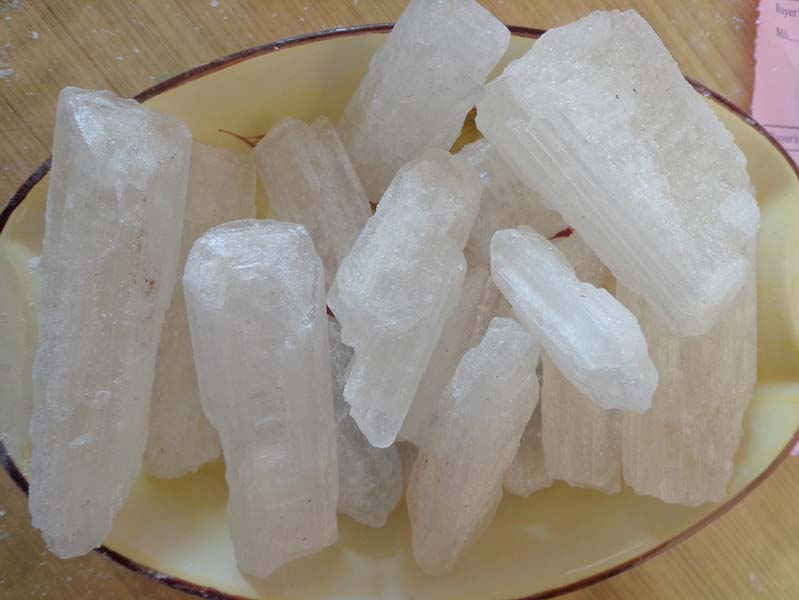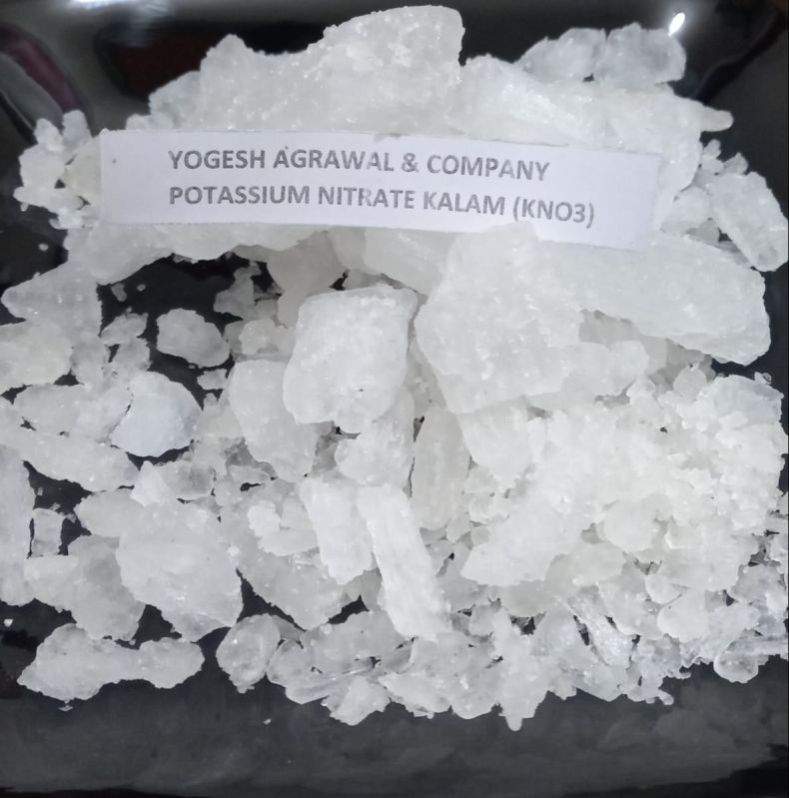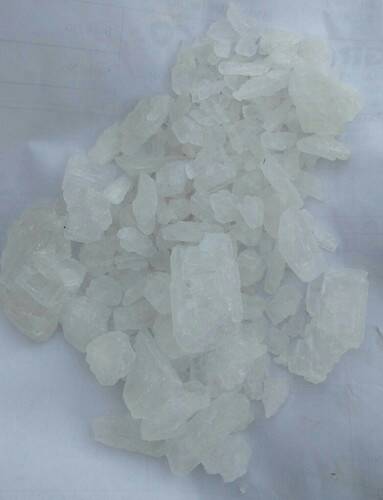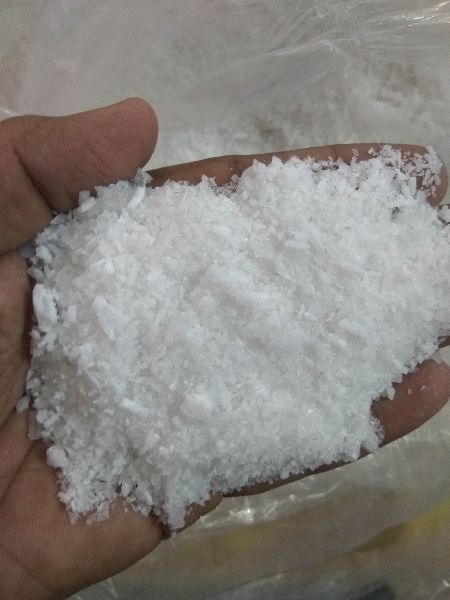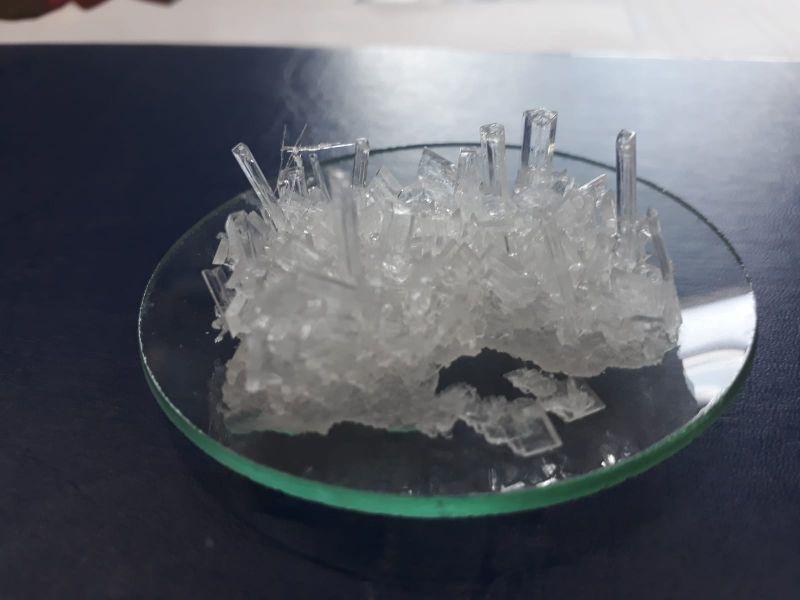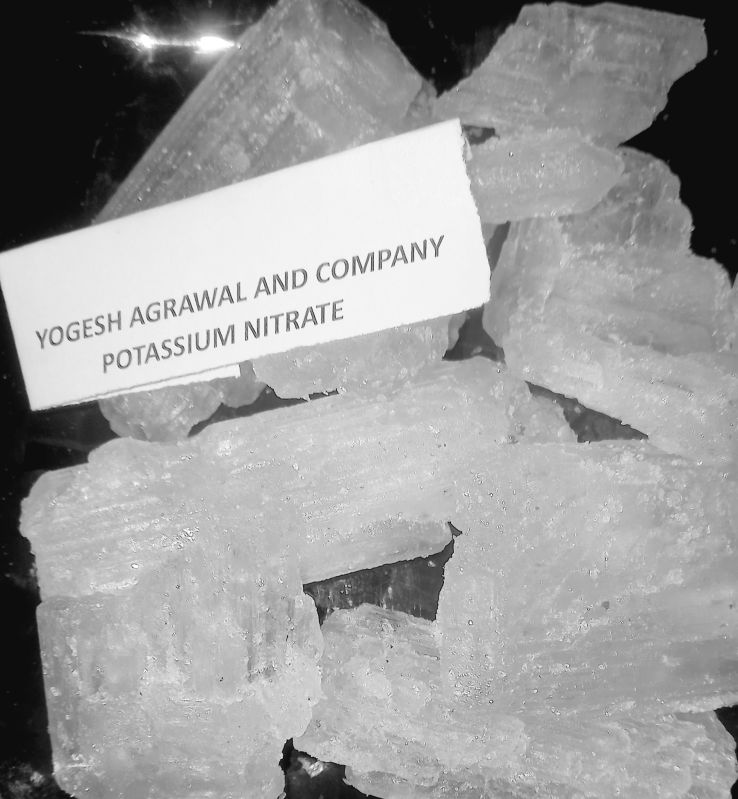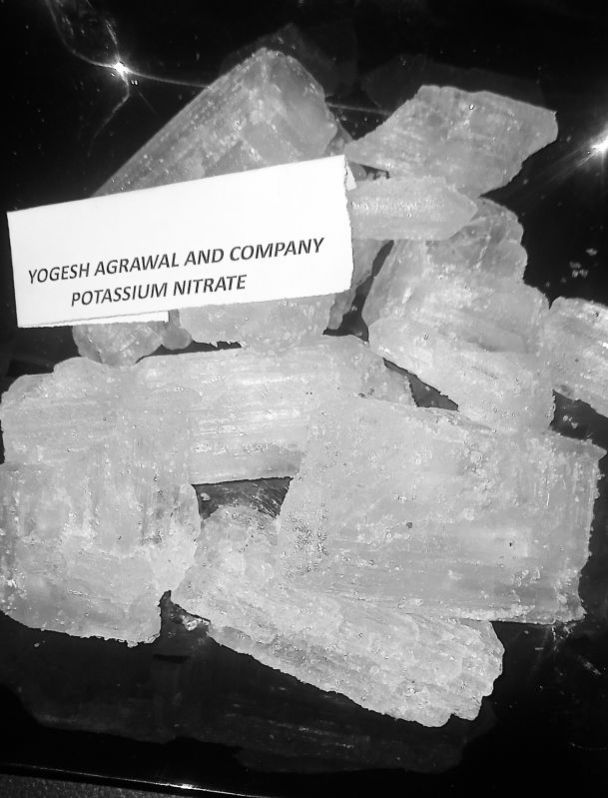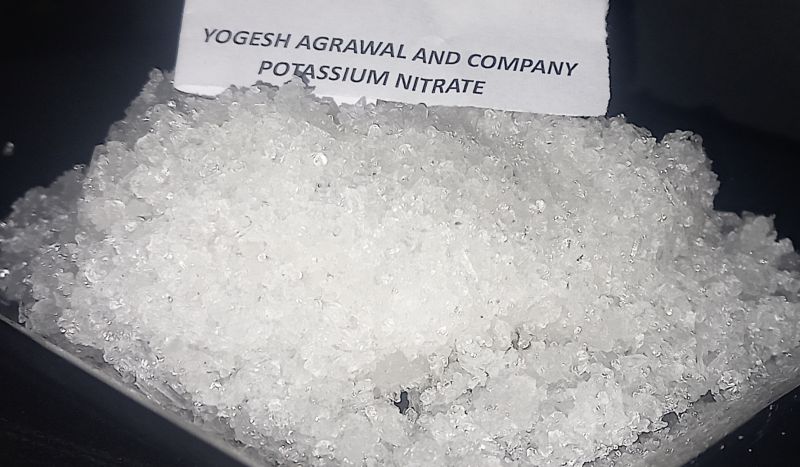Jalesar, Etah, Uttar Pradesh
- GST NO. : 09AAXPA0890R1ZT
Potassium Nitrate
YOGESH AGRAWAL AND COMPANY is a leading potassium nitrate crystal or saltpetre manufacturer in Uttar Pradesh with extensive expertise in manufacturing high-quality potassium nitrate bold kalam, potassium nitrate kalam, potassium nitrate super bold kalam, potassium nitrate big crystal, potassium nitrate dryer crystal, potassium nitrate small crystal, potassium nitrate super crystal, and potassium nitrate wet crystal. The potassium nitrate crystal is a chemical substance comprising potassium and nitrate ions. It is soluble in hot water, and when heated or decomposed, it releases oxygen.
Potassium nitrate crystal finds its applications in the fertilizer industry. It is used as a fertilizer because it has essential macronutrients required for the plant's growth. Plants absorb potassium nitrate, which helps boost their ability to resist diseases. It protects plants from fungi, bacteria, viruses, and nematodes. By enhancing soil water absorption, potassium nitrate supports plants to tolerate drought. The application of potassium nitrate as fertilizer helps farmers control water loss. Potassium in the compound controls the closing and opening of the stomata in plants, helping them use less water by minimizing transpiration and applying potassium nitrate in farming to supply enough potassium to plants, boosting their capacity to absorb water from the soil. Potassium nitrate also prevents the salt buildup. Apart from agricultural uses, potassium nitrate crystal is used to manufacture explosives, cigarettes, glass, fireworks, rocket fuels, and toothpaste to help with tooth sensitivity and preserve meat products and other food items against microbial agents.
YOGESH AGRAWAL AND COMPANY has successfully marked a strong presence in the domestic market. We believe in supplying high-quality products that meet global standards. We use high-density polyethylene (HDPE) bags to pack our chemicals, ensuring safe and prompt delivery. Our industry experience, customer-centric approach, highest quality standards, efficient workforce, and top-notch distribution network make us a successful saltpetre supplier in India.
| Business Type | Manufacturer, Exporter, Supplier |
| Product Code | Potassium Nirate |
Potassium nitrate, also known as saltpeter, is a chemical compound with the formula KNO₃. It is a type of salt that is commonly used in various applications, and here are some key points about potassium nitrate:
Chemical Composition:
Chemical Formula: KNO₃
Molar Mass: Approximately 101.10 g/mol
Physical Properties:
Potassium nitrate is a crystalline solid that appears as a colorless and odorless powder or as transparent crystals.
It has a melting point of about 334 °C (633.2 °F).
Occurrence:
Potassium nitrate occurs naturally in some soils, where it is formed through the decomposition of organic matter and the action of bacteria.
Common Uses:
Fertilizer: Potassium nitrate is used as a source of nitrogen and potassium in fertilizers, promoting plant growth.
Food Preservation: It is used in the preservation of certain types of food, especially meat, as a preservative.
Pyrotechnics: Potassium nitrate is a key component in the production of fireworks and gunpowder, where it serves as an oxidizing agent.
Medicine: Historically, it has been used in some traditional medicines. However, its use in medicine is limited due to potential toxicity.
Firearm and Explosive Applications:
Potassium nitrate is a major component of gunpowder (black powder). In combination with charcoal and sulfur, it forms a mixture that combusts rapidly, producing gases that propel bullets and shells.
Safety Considerations:
While potassium nitrate is generally safe when used properly, it can be hazardous in large quantities. Ingesting or inhaling large amounts can be harmful, and exposure to the eyes or skin may cause irritation.
As with any chemical substance, it is important to follow safety guidelines and handle potassium nitrate with care.
Regulation:
The sale and use of potassium nitrate may be regulated due to its potential use in the production of explosives. In some places, it may be subject to certain legal restrictions.
It's important to note that the uses and regulations surrounding potassium nitrate may vary depending on the country and local laws. If you have specific questions about its use or availability, it's recommended to consult relevant local regulations and guidelines.
| Business Type | Manufacturer, Exporter, Supplier |
| Product Code | SALTPETRE |
YOGESH AGRAWAL AND COMPANY is a leading potassium nitrate kalam or kalmi shora manufacturer in Uttar Pradesh with extensive expertise in manufacturing high-quality potassium nitrate kalam. The potassium nitrate kalam or kalmi shora is a chemical substance comprising potassium and nitrate ions. It is soluble in hot water, and when heated or decomposed, it releases oxygen.
Potassium nitrate kalam finds its applications in the fertilizer industry. It is used as a fertilizer because it has essential macronutrients required for the plant's growth. Plants absorb potassium nitrate, which helps boost their ability to resist diseases. It protects plants from fungi, bacteria, viruses, and nematodes. By enhancing soil water absorption, potassium nitrate supports plants to tolerate drought. The application of kalmi shora as fertilizer helps farmers control water loss. Potassium in the compound controls the closing and opening of the stomata in plants, helping them use less water by minimizing transpiration and applying kalmi shora in farming to supply enough potassium to plants, boosting their capacity to absorb water from the soil. Apart from agricultural uses, potassium nitrate is used to manufacture explosives, cigarettes, glass, fireworks, rocket fuels, and toothpaste to help with tooth sensitivity and preserve meat products and other food items against microbial agents.
YOGESH AGRAWAL AND COMPANY is the leading kalmi shora supplier in India and has successfully established a strong foothold in the domestic market. We believe in supplying high-quality products that meet global standards. We use high-density polyethylene (HDPE) bags to pack our chemicals, ensuring safe and prompt delivery. Our state-of-the-art technology, industry experience, highest quality standards, and efficient workforce make us a successful kalmi shora manufacturer in India.
| Business Type | Manufacturer, Exporter, Supplier |
| Product Code | Potassium Nirate |
Potassium nitrate, also known as saltpeter, is a chemical compound with the formula KNO₃. It is a type of salt that is commonly used in various applications, and here are some key points about potassium nitrate:
Chemical Composition:
Chemical Formula: KNO₃
Molar Mass: Approximately 101.10 g/mol
Physical Properties:
Potassium nitrate is a crystalline solid that appears as a colorless and odorless powder or as transparent crystals.
It has a melting point of about 334 °C (633.2 °F).
Occurrence:
Potassium nitrate occurs naturally in some soils, where it is formed through the decomposition of organic matter and the action of bacteria.
Common Uses:
Fertilizer: Potassium nitrate is used as a source of nitrogen and potassium in fertilizers, promoting plant growth.
Food Preservation: It is used in the preservation of certain types of food, especially meat, as a preservative.
Pyrotechnics: Potassium nitrate is a key component in the production of fireworks and gunpowder, where it serves as an oxidizing agent.
Medicine: Historically, it has been used in some traditional medicines. However, its use in medicine is limited due to potential toxicity.
Firearm and Explosive Applications:
Potassium nitrate is a major component of gunpowder (black powder). In combination with charcoal and sulfur, it forms a mixture that combusts rapidly, producing gases that propel bullets and shells.
Safety Considerations:
While potassium nitrate is generally safe when used properly, it can be hazardous in large quantities. Ingesting or inhaling large amounts can be harmful, and exposure to the eyes or skin may cause irritation.
As with any chemical substance, it is important to follow safety guidelines and handle potassium nitrate with care.
Regulation:
The sale and use of potassium nitrate may be regulated due to its potential use in the production of explosives. In some places, it may be subject to certain legal restrictions.
It's important to note that the uses and regulations surrounding potassium nitrate may vary depending on the country and local laws. If you have specific questions about its use or availability, it's recommended to consult relevant local regulations and guidelines.
| Business Type | Manufacturer, Exporter, Supplier |
| Grade | Industrial Grade,Pharma Grade, Other |
| Purity | Other |
| Color | White |
| Shelf Life | Long |
| Packaging Type | Plastic Bags |
| Type | Potassium Nitrate |
| Application | Other |
| CAS Number | 7757-79-1 |
| Molecular Weight | 101.1032 g/mol |
| PH Value | 6.2 |
| Solubility | 100% in Water |
| Moisture | 7% Ex Factory |
| Chloride | 1.5% Max |
Potassium nitrate, also known as saltpeter, is a chemical compound with the formula KNO₃. It is a type of salt that is commonly used in various applications, and here are some key points about potassium nitrate:
Chemical Composition:
Chemical Formula: KNO₃
Molar Mass: Approximately 101.10 g/mol
Physical Properties:
Potassium nitrate is a crystalline solid that appears as a colorless and odorless powder or as transparent crystals.
It has a melting point of about 334 °C (633.2 °F).
Occurrence:
Potassium nitrate occurs naturally in some soils, where it is formed through the decomposition of organic matter and the action of bacteria.
Common Uses:
Fertilizer: Potassium nitrate is used as a source of nitrogen and potassium in fertilizers, promoting plant growth.
Food Preservation: It is used in the preservation of certain types of food, especially meat, as a preservative.
Pyrotechnics: Potassium nitrate is a key component in the production of fireworks and gunpowder, where it serves as an oxidizing agent.
Medicine: Historically, it has been used in some traditional medicines. However, its use in medicine is limited due to potential toxicity.
Firearm and Explosive Applications:
Potassium nitrate is a major component of gunpowder (black powder). In combination with charcoal and sulfur, it forms a mixture that combusts rapidly, producing gases that propel bullets and shells.
Safety Considerations:
While potassium nitrate is generally safe when used properly, it can be hazardous in large quantities. Ingesting or inhaling large amounts can be harmful, and exposure to the eyes or skin may cause irritation.
As with any chemical substance, it is important to follow safety guidelines and handle potassium nitrate with care.
Regulation:
The sale and use of potassium nitrate may be regulated due to its potential use in the production of explosives. In some places, it may be subject to certain legal restrictions.
It's important to note that the uses and regulations surrounding potassium nitrate may vary depending on the country and local laws. If you have specific questions about its use or availability, it's recommended to consult relevant local regulations and guidelines.
| Business Type | Manufacturer, Exporter, Supplier |
| Grade | Industrial Grade,Pharma Grade, Other |
| Color | Snow-white |
| Type | Potassium Nitrate |
| Application | Other |
| Condition | Raw |
| Form | Crystal |
| CAS Number | 7757-79-1 |
| Usage | Industrial |
| Molecular Weight | 101.1032 g/mol |
| PH Value | 6.2 |
| Solubility | 100% in Water |
| Moisture | 7% Ex Factory |
Potassium nitrate, also known as saltpeter, is a chemical compound with the formula KNO₃. It is a type of salt that is commonly used in various applications, and here are some key points about potassium nitrate:
Chemical Composition:
Chemical Formula: KNO₃
Molar Mass: Approximately 101.10 g/mol
Physical Properties:
Potassium nitrate is a crystalline solid that appears as a colorless and odorless powder or as transparent crystals.
It has a melting point of about 334 °C (633.2 °F).
Occurrence:
Potassium nitrate occurs naturally in some soils, where it is formed through the decomposition of organic matter and the action of bacteria.
Common Uses:
Fertilizer: Potassium nitrate is used as a source of nitrogen and potassium in fertilizers, promoting plant growth.
Food Preservation: It is used in the preservation of certain types of food, especially meat, as a preservative.
Pyrotechnics: Potassium nitrate is a key component in the production of fireworks and gunpowder, where it serves as an oxidizing agent.
Medicine: Historically, it has been used in some traditional medicines. However, its use in medicine is limited due to potential toxicity.
Firearm and Explosive Applications:
Potassium nitrate is a major component of gunpowder (black powder). In combination with charcoal and sulfur, it forms a mixture that combusts rapidly, producing gases that propel bullets and shells.
Safety Considerations:
While potassium nitrate is generally safe when used properly, it can be hazardous in large quantities. Ingesting or inhaling large amounts can be harmful, and exposure to the eyes or skin may cause irritation.
As with any chemical substance, it is important to follow safety guidelines and handle potassium nitrate with care.
Regulation:
The sale and use of potassium nitrate may be regulated due to its potential use in the production of explosives. In some places, it may be subject to certain legal restrictions.
It's important to note that the uses and regulations surrounding potassium nitrate may vary depending on the country and local laws. If you have specific questions about its use or availability, it's recommended to consult relevant local regulations and guidelines.
| Business Type | Manufacturer, Exporter, Supplier |
| Grade | Industrial Grade,Pharma Grade, Other |
| Color | Snow-white |
| Melting Point | 334 DegreeC (633 DegreeF; 607 K) |
| Shelf Life | Long |
| Packaging Type | Plastic Bags |
| Type | Potassium Nitrate |
| Application | Other |
| Condition | Raw |
| Appearance | White Crystal |
| Density | 2.109 G/cm3 |
| Form | Small Crystal |
| Molecular Weight | 101.1032 g/mol |
| pH Value | 6.2 |
| Boiling Point | 400 DegreeC |
| Solubility | 100% in Water |
| Moisture | 7% Ex Factory |
Potassium nitrate, also known as saltpeter, is a chemical compound with the formula KNO₃. It is a type of salt that is commonly used in various applications, and here are some key points about potassium nitrate:
Chemical Composition:
Chemical Formula: KNO₃
Molar Mass: Approximately 101.10 g/mol
Physical Properties:
Potassium nitrate is a crystalline solid that appears as a colorless and odorless powder or as transparent crystals.
It has a melting point of about 334 °C (633.2 °F).
Occurrence:
Potassium nitrate occurs naturally in some soils, where it is formed through the decomposition of organic matter and the action of bacteria.
Common Uses:
Fertilizer: Potassium nitrate is used as a source of nitrogen and potassium in fertilizers, promoting plant growth.
Food Preservation: It is used in the preservation of certain types of food, especially meat, as a preservative.
Pyrotechnics: Potassium nitrate is a key component in the production of fireworks and gunpowder, where it serves as an oxidizing agent.
Medicine: Historically, it has been used in some traditional medicines. However, its use in medicine is limited due to potential toxicity.
Firearm and Explosive Applications:
Potassium nitrate is a major component of gunpowder (black powder). In combination with charcoal and sulfur, it forms a mixture that combusts rapidly, producing gases that propel bullets and shells.
Safety Considerations:
While potassium nitrate is generally safe when used properly, it can be hazardous in large quantities. Ingesting or inhaling large amounts can be harmful, and exposure to the eyes or skin may cause irritation.
As with any chemical substance, it is important to follow safety guidelines and handle potassium nitrate with care.
Regulation:
The sale and use of potassium nitrate may be regulated due to its potential use in the production of explosives. In some places, it may be subject to certain legal restrictions.
It's important to note that the uses and regulations surrounding potassium nitrate may vary depending on the country and local laws. If you have specific questions about its use or availability, it's recommended to consult relevant local regulations and guidelines.
| Business Type | Manufacturer, Exporter, Supplier |
| Grade | Industrial Grade,Pharma Grade, Other |
| Purity | 99%,99.5% |
| Color | Off-white,White |
| Brand Name | Yogesh Blue Lion |
| Melting Point | 200-400 °C |
| Shelf Life | 3 Yrs, Long |
| Packaging Type | Plastic Bags |
| Country of Origin | India |
| Type | Potassium Nitrate |
| Application | Other |
| Condition | Refined |
| Form | Crystal,Solid |
| Physical Status | Solid |
| Melting Poin | 334 Degree C |
| Physical State | Crystals |
| Usage | Industrial, Laboratory |
| Applications | Fireworks Industry, Pharma Industry, Agriculture Etc. |
| Features | Easy and safe to process, Unadulterated, High melting point |
| Product Code | 2834 |
| Delivery Time | 2 Days |
| Packaging Details | 25 kg and 50 Kg Bags |
Potassium nitrate, also known as saltpeter, is a chemical compound with the formula KNO₃. It is a type of salt that is commonly used in various applications, and here are some key points about potassium nitrate:
Chemical Composition:
Chemical Formula: KNO₃
Molar Mass: Approximately 101.10 g/mol
Physical Properties:
Potassium nitrate is a crystalline solid that appears as a colorless and odorless powder or as transparent crystals.
It has a melting point of about 334 °C (633.2 °F).
Occurrence:
Potassium nitrate occurs naturally in some soils, where it is formed through the decomposition of organic matter and the action of bacteria.
Common Uses:
Fertilizer: Potassium nitrate is used as a source of nitrogen and potassium in fertilizers, promoting plant growth.
Food Preservation: It is used in the preservation of certain types of food, especially meat, as a preservative.
Pyrotechnics: Potassium nitrate is a key component in the production of fireworks and gunpowder, where it serves as an oxidizing agent.
Medicine: Historically, it has been used in some traditional medicines. However, its use in medicine is limited due to potential toxicity.
Firearm and Explosive Applications:
Potassium nitrate is a major component of gunpowder (black powder). In combination with charcoal and sulfur, it forms a mixture that combusts rapidly, producing gases that propel bullets and shells.
Safety Considerations:
While potassium nitrate is generally safe when used properly, it can be hazardous in large quantities. Ingesting or inhaling large amounts can be harmful, and exposure to the eyes or skin may cause irritation.
As with any chemical substance, it is important to follow safety guidelines and handle potassium nitrate with care.
Regulation:
The sale and use of potassium nitrate may be regulated due to its potential use in the production of explosives. In some places, it may be subject to certain legal restrictions.
It's important to note that the uses and regulations surrounding potassium nitrate may vary depending on the country and local laws. If you have specific questions about its use or availability, it's recommended to consult relevant local regulations and guidelines.
| Business Type | Manufacturer, Exporter, Supplier |
| Grade | Industrial,Technical Grade |
| Purity | 99% |
| Color | White |
| Melting Point | 334 DegreeC (633 DegreeF; 607 K) |
| Shelf Life | Long |
| Packaging Type | Plastic Bags |
| Type | Potassium Nitrate |
| Application | Other |
| Condition | Raw |
| Density | 2.109 G/cm3 |
| Form | Wet Crystal |
| Physical State | Crystals |
| Chemical Formula | KNO3 |
| CAS Number | 7757-79-1 |
| Usage | Industrial |
| Molecular Weight | 101.1032 g/mol |
| pH Value | 6.2 |
| Boiling Point | 400 DegreeC |
| Solubility | 100% in Water |
| Moisture | 7% Ex Factory |
| Hardness | Little |
| Storage Condition | Cool and Dry Place |
| Water Solubility | 100% |
| Delivery Time | 2 Days |
| Packaging Details | 50 Kg Hdpe Bags |
Potassium nitrate, also known as saltpeter, is a chemical compound with the formula KNO₃. It is a type of salt that is commonly used in various applications, and here are some key points about potassium nitrate:
Chemical Composition:
Chemical Formula: KNO₃
Molar Mass: Approximately 101.10 g/mol
Physical Properties:
Potassium nitrate is a crystalline solid that appears as a colorless and odorless powder or as transparent crystals.
It has a melting point of about 334 °C (633.2 °F).
Occurrence:
Potassium nitrate occurs naturally in some soils, where it is formed through the decomposition of organic matter and the action of bacteria.
Common Uses:
Fertilizer: Potassium nitrate is used as a source of nitrogen and potassium in fertilizers, promoting plant growth.
Food Preservation: It is used in the preservation of certain types of food, especially meat, as a preservative.
Pyrotechnics: Potassium nitrate is a key component in the production of fireworks and gunpowder, where it serves as an oxidizing agent.
Medicine: Historically, it has been used in some traditional medicines. However, its use in medicine is limited due to potential toxicity.
Firearm and Explosive Applications:
Potassium nitrate is a major component of gunpowder (black powder). In combination with charcoal and sulfur, it forms a mixture that combusts rapidly, producing gases that propel bullets and shells.
Safety Considerations:
While potassium nitrate is generally safe when used properly, it can be hazardous in large quantities. Ingesting or inhaling large amounts can be harmful, and exposure to the eyes or skin may cause irritation.
As with any chemical substance, it is important to follow safety guidelines and handle potassium nitrate with care.
Regulation:
The sale and use of potassium nitrate may be regulated due to its potential use in the production of explosives. In some places, it may be subject to certain legal restrictions.
It's important to note that the uses and regulations surrounding potassium nitrate may vary depending on the country and local laws. If you have specific questions about its use or availability, it's recommended to consult relevant local regulations and guidelines.
Specifications
| Chemical Formula | KNO3 |
| Appearance | WHITE CRYSTAL / WHITE CRYSTAL POWDER |
| Other Names | Saltpetre, Saltpeter, Kalmi Shora, Nitrate Of Potash |
| Odor | Odorless |
| Solubility In Water | 100% Soluble |
| Assay Or Purity | 99% MIN. |
| PPM | UNDER 1500 PPM |


